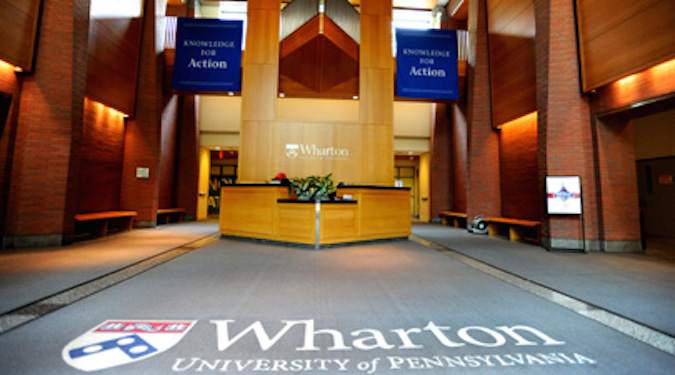Wake Forest’s No. 1 academic ranking stems from a combination of faculty tough love and accessibility. In Bloomberg Businessweek’s survey, one Wake Forest student lauds the program’s “extremely rigorous courseload that [pushes] students . . . to go above and beyond what they think is their own personal limits.” Echoing these sentiments, another student cites the school’s personal touch. “Every single professor I have had genuinely cares about their students.”
A FOUR-WAY TIE FOR SECOND PLACE
Behind Wake Forest, you’ll find four schools making a photo finish at No. 2: Notre Dame University (Mendoza), the University of Pennsylvania (Wharton), the University of Richmond (Robins), and the University of Virginia (McIntire).
At Mendoza, which ranked No. 1 overall for the past two years, students entered with the fifth-highest LSAT scores (1419). However, it is Notre Dame’s curriculum, infused with a “social responsibility and ethics,” that draws students. Writes one Mendoza student, “The school as a whole, and especially the professors, keep the focus on the big picture — what can business do to help society with the challenges it faces? Lectures, class material, and discussions focus on ‘how can you as an individual be an effective leader for positive change,’ not ‘how can you get ahead and be a superstar your boss will love and promote?’ The focus on personal development of character, through ethical decision making and keeping a larger goal in mind, is the most impressive thing to me, as these are skills and traits that will be transferable no matter what job or industry I work in.”
Conversely, students praise Wharton’s technical emphasis and selectivity. “Wharton’s quantitative academic rigor is one of its strongest aspects,” argues one student. “Moreover, the quality of my classmates is second to none, and the opportunity to learn from, work with, and compete against the best business minds in the country is nearly as impactful to my overall education as is the strong academic program.” In fact, students who strive higher often reap bigger rewards at Wharton, gushes another student. “I think the professors and classes almost always give you the opportunity to get as much out of them as you want. I rarely felt like if I were to try 10% harder I would not get 10% more out of it. You can achieve what you are willing to put into it.”
Like Wake Forest, Richmond University’s small class sizes (8-to-1) also enable faculty to balance high expectations with deep personal relationships with students. “Professors know students by name (first and last),” enthuses one Robins student. “They know our strengths and weaknesses, and they are so willing to get to know us and help us in any way possible. I have established excellent relationships with faculty, and I have learned so much as a result.” However, don’t expect faculty to go easy on their students. “Business [students] are expected to perform at a very high level. While at times the workload has seemed a bit excessive, I feel strongly that my experiences have prepared me to excel in the workforce.”
Finally, the University of Virginia – which is tied with Wharton for graduating students with the highest starting salaries ($70,000) – is praised by students for delivering a strong dose of team projects and case studies. “Group work is emphasized in most, if not all, classes,” observes one McIntire student. “In addition, communication skills was also emphasized. These two factors helped me a lot in my internship after my third-year.”
SOUTHERN METHODIST MAKES BIGGEST GAINS OVER 2013
Looking for a program heading straight up? Take a look at Southern Methodist University’s Cox School of Business. Last year, it ranked No. 46 academically. This year, it jumped 37 spaces to reach No. 9 academically (and No. 21 overall). How? To begin, students love the program, helping it reach No. 11 in terms of student survey results. They also gave faculty an A+ grade. Not to mention, students entered the program with an average 1414 SAT score, just a shade below Notre Dame’s business majors. And to replay a familiar theme, students love Cox’s roughly 14:1 student-to-faculty ratio. “I think that the smaller classes and group projects make the program feel more like an office,” one student tells Bloomberg Businessweek.
Another big academic winner? That’d be Indiana University’s Kelley School of Business, which climbed from No. 28 to No. 12 in one year. Here, students tout the “real world” application of theory. “I think the practical approach of our program sets it apart from others,” muses one Kelley respondent. “With our extremely beneficial technology classes as well as a focus on the development of structured analytical thinking, it positions students to succeed from day 1 in the workplace.”














Questions about this article? Email us or leave a comment below.